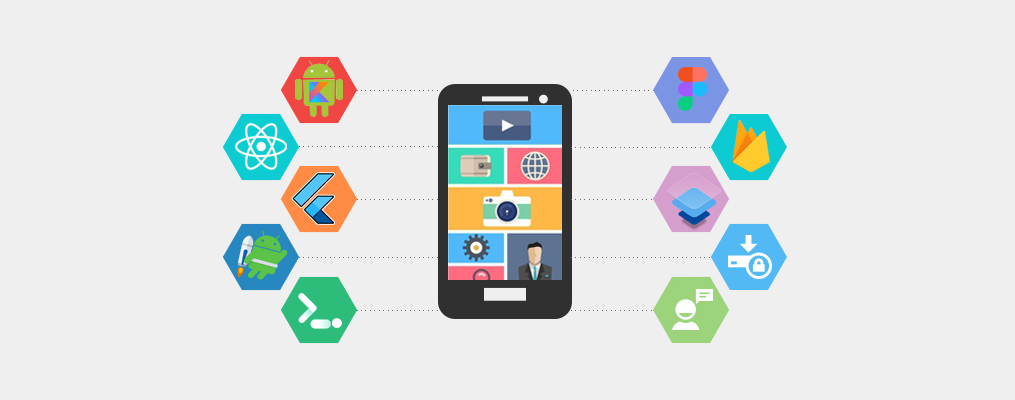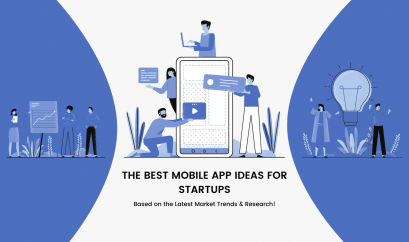11 Latest & Trending Mobile App Development Technologies 2020

Mobile App Development
While building the right technology stack for mobile app development, one of the most common challenges developers face is the selection and addition of the latest technologies. Be it Android app development, iOS app development or cross-platform custom mobile app development, the inclusion of outdated mobile app development technologies in your development stack may cause your mobile app to fail considerably.
To help you out, after doing our research on the latest mobile app development trends, here we’re presenting you with the eight latest and trending technologies that are currently being used on a large scale to develop state-of-the-art mobile applications for Android and iOS platforms. Adding these technologies to your development stack will definitely help you build mobile apps faster than ever.
Let’s get started!
Top 12 Latest Mobile App Development Technologies 2020
#Android Jetpack:
One of the recently launched mobile app development technologies, which is increasingly becoming popular among mobile app developers is Android Jetpack. It is essentially a set of Android software components, tools, and best practices, making it easier for developers to build high quality, robust Android apps in a very short span of time. Make sure to add this handy tool to your set of latest technologies if you want to develop some really great Android apps.
#Kotlin:
While Java has always been the primary language for developing Android applications, Kotlin – a statically typed programming language – is one among the revolutionary mobile app development technologies that are being used for developing modern Android applications today. Addressing all the limitations of Java, Kotlin for Android developers is definitely a modern answer to obsolete Java.
#Flutter:
Created by Google, Flutter is an open-source mobile app development SDK used to craft high-quality, cross-platform native interfaces for Android and iOS platforms. Instead of JavaScript, Flutter makes use of Dart, a relatively new programming language, to help developers build native interfaces in minutes. Owing to its flexibility in development, it has become one of the most popular and widely used mobile app development technologies today.
#React Native:
Another addition to this informative list of mobile app development technologies is React Native – an open-source framework developed by Facebook to help developers build cross-platform native mobile apps using only JavaScript and ReactJS. Cross-platform Android and iOS apps developed with React Native feel, look, and function exactly like native apps, making React Native one of the most sought-after mobile app development technologies today.
Also Read: React Native vs Native App Development- A Fair Comparison
#Codota:
If you’re a kind of developer who always has to write a lot of code, this AI-powered tool is going to simplify your life. Providing you with a fantastic way to code faster and smarter with fewer errors, Codota saves you a lot of development time and efforts. The only limitation of Codota is that it currently integrates with the Java IDEs, such as IntelliJ or Android Studio. However, according to the official Codota site, Codota will be supporting more mobile app development technologies in the near future.
#Figma:
When we’re talking about mobile app development technologies, we couldn’t overlook adding this great design tool to the list. Self-proclaimed as the first browser-based interface design tool, Figma facilitates both designers and developers to create fully-functional user interfaces for their mobile apps. So if you’re a developer cum designer, be sure to add this handy tool to your stack of latest mobile app development technologies.
#Firebase:
Developed and maintained by Google, Firebase is a comprehensive set of different mobile app development technologies that help developers build visually appealing and feature-rich mobile apps faster without compromising the app quality. Supporting both Android and iOS, Firebase is considered one of the best mobile app development technologies for building apps integrated with a real-time database. As a start, you can try out Firebase free ‘Spark’ Plan that offers up to 5GB storage with limited features.
#Golang
Often referred to as “Golang,” Go is a relatively new programming language embraced by many professionals to develop simple, reliable, and efficient mobile apps that do not consume much memory. The main reason why Go is so popular is its minimal syntax and shallow learning curve. Because of being extremely lightweight and supporting multithreading actively, Go has increasingly become the programming language of choice for many developers to build enterprise apps.
#Swift
If you are in iOS app development and building a specific app related to Apple, then you must be familiar with Swift – a new open-source programming language for iOS, macOS, iPadOS, watchOS, tvOS, and Linux. As compared to Objective-C, Swift features a more concise yet expressive syntax, making it easy to write applications that are incredibly fast and safe by design. Apps like LinkedIn, Hipmunk, and Lyft are developed and upgraded to a higher iOS version using Swift.
#Ionic
Ionic Framework is an open-source mobile UI toolkit using which you can build high-quality, cross-platform mobile apps and progressive web apps. With a library of mobile-optimized UI components, reusable components that are written in HTML, CSS, and JavaScript, Ionic enables mobile app developers to ship apps to the app stores with a single codebase. Moreover, it integrates seamlessly with popular frontend frameworks such as Angular, React, and Vue.
#Apache Cordova
Formerly PhoneGap, Apache Cordova is a free and open-source mobile application development framework designed to let you build highly interactive and fast mobile apps with HTML5, CSS3, and JavaScript. The code is reusable across multiple platforms, and you can even access native device APIs. Additionally, Apache Cordova lets you use a single codebase and supports offline scenarios as well.
Hopefully, you’ll find this article informative and helpful. If you have any queries, feel free to contact us.


